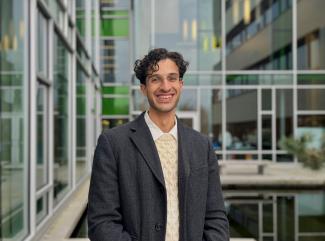
“I came to law school to be the change I wanted to see in the world,” says Yanni Nicolidakis-Mustafa, third-year JD student at the Allard School of Law at UBC. “I knew the law would challenge me intellectually, but also expose me to systemic and structural challenges lying at the core of our society. I could immerse myself in these challenges while helping those who need assistance the most.”
This spring, in recognition of his community involvement, leadership and academic achievement, Yanni was named a Wesbrook Scholar – UBC’s most prestigious designation for senior students.
He says the award is just further proof of the importance of working towards greater access to justice. “Receiving this award not only affirmed my work in public interest, but the work of many people in the public interest community,” he notes. “I would not have received this award without my community’s support or without those who paved the way for students like me.”
While at Allard Law, Yanni has been a dedicated advocate for marginalized people and communities. As a volunteer with the Law Student’s Legal Advice Program at Allard Law and with First United Advocacy, he’s worked to prevent homelessness and advocate for the rights of people living in precarity on Vancouver’s Downtown Eastside. Recently, he worked with Allard Law Professor Efrat Arbel on a submission to the Supreme Court regarding the constitutionality of the Canada-US Safe Third Country Agreement.
We spoke with Yanni about his work to increase access to justice for some of the most vulnerable – and what’s next for him as his time in law school wraps up.
As a law student, one area you’ve focused on is defending the rights of the homeless. What have you learned through this work?
I learned you can never make assumptions about anyone. Every client I serve reminds me that everyone has a story and hides their pain under the mask they wear. And this isn’t just true for the homeless and those on Vancouver’s DTES. I quickly realized that many people rarely (if ever) experience someone sitting down with the sole intent of genuinely listening to their story – I never thought the mere creation of this space could have an immeasurable impact on someone.
I also learned that to do this work, I not only needed to love people in all their humanity, but I could only feel compassion for others insofar as I treat myself with compassion. This work demonstrates the importance of having a caring and supportive community – among clients and among advocates – and the value of leaning on others who share a vision.
You worked with Professor Efrat Arbel on a submission to the Supreme Court of Canada about the constitutionality of the Canada-US Safe Third Country Agreement. What was it like getting to work on such an important case?
Working with Efrat on the intervention completely changed the way I approach legal issues and the way I viewed myself in the law. At first, I was apprehensive when she called me in to work directly with the lawyers working on the intervention. However, I deferred to her judgement.
Over the coming months, I worked closely with the team and they collectively granted me the space to develop my confidence and meaningfully contribute to the submission. It was a remarkable experience working with Efrat and other amazing lawyers (and watching the hearing live at 5AM) – but it was Efrat’s faith in me and the ensuing self-actualization as a legal thinker that fundamentally changed who I am in the law.
Which law class or experience had the biggest impact on you during your time at Allard?
There are too many to list – the Gale Moot, the UBC Innocence Project, countless seminars – but PACE Society’s clinic with the Law Students’ Legal Advice Program (LSLAP) is where I realized my capacity and passion for advocacy. PACE is a peer-driven society working to support and reduce harm for current and former sex workers; LSLAP is a non-profit legal assistance program run by Allard students with the support of amazing lawyers.
At PACE, I realized the transformative power of compassion in providing legal assistance to vulnerable clients, and that my work could change the course of people’s lives. It was also here that I learned to foster a love ethic in my work – that increasing access to justice cannot exist in the hypothetical but requires a deep sense of personal responsibility and a commitment to reducing harm, nurturing human life, and building connected communities. PACE set me on my path, forever changing who I am as an advocate and who I am as a person.
Is there a student or professor whose support you’re particularly grateful for?
Professor Efrat Arbel. Working with Efrat not only provided me with insight, confidence and the opportunity for self-actualization, but she is emblematic of the advocate I hope to embody – kind, patient, brilliant, thoughtful, and deeply passionate about her work – all while emitting a radiance that her colleagues know well.
I know for a fact I would not be where I am today without her support and her faith in me, and I am endlessly grateful for her.
What’s next after graduation?
I’m beyond thrilled to be articling for the Community Legal Assistance Society after graduation - CLAS is a team of phenomenal lawyers and advocates working in human rights, mental health law and public interest test case litigation, such as a Charter challenge to BC’s “deemed consent” provisions.
The following year, I’ll have the incredible opportunity of being a judicial law clerk at the BC Court of Appeal. I’m keeping the horizon clear for many possibilities afterwards, but I plan to let my values continue guiding me as I work to address systemic challenges and access to justice.


